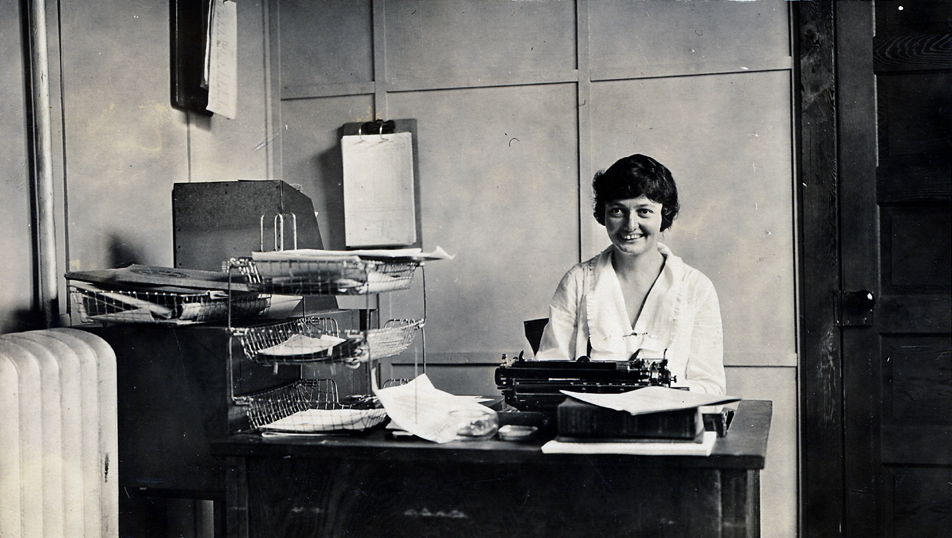In the late 1800s, Wine of Cardui and Lydia E. Pinkham’s Vegetable Compound were among national medications advertised in Asheville’s local papers. Initially, the concoctions promised relief from menstrual pain. But as the new century began and as more women continued to enter the workforce, these same medicines broadened their appeal to include benefits like stamina and strength for the working woman.
One advertisement for Pinkham’s Vegetable Compound, which appeared in The Asheville Daily Citizen in 1900, featured testimonials from across the country. No matter where these women lived or what they suffered, they all claimed the compound allowed them “to work all day.”
These advertisements typically portrayed women as frail and weak. Despite the unflattering characterization, the promotions also provide glimpses into the working conditions women faced at the turn of the 20th century.
Wine of Cardui, for example, featured the following message in local papers throughout the early part of 1900:
“Many girls and women find it necessary to earn their own living in various kinds of employment. Their work is often so hard and confining that the health breaks down. Their delicate constitutions are unfitted for tiresome tasks. Weakness nearly always makes its appearance in the peculiarly delicate womanly organs. Constant standing on the feet, and coming and going at the beck of a superintendent or foreman, induces falling of the womb, leucorrhea, headache and backache. The pay of women workers is often so notoriously small that when sickness comes they have no money to engage skillful physicians. To them Wine of Cardui is truly a blessing. It cures them of their ills at a small cost, and they can act as their own physicians. No doctor can do as much for ‘female troubles’ as Wine of Cardui.”
By 1912, The Asheville Gazette News reported that an estimated 9 million women had entered the workforce. That same year, local physician Dr. Molly Ameila Fendler spoke with The Sunday Citizen, offering health tips to Asheville’s working women.
Not mincing her words, Fendler lectured female readers about their lack of proper self-care:
“The average working woman spends more time in the morning seeing that her hair is done in the latest fashion, that her dress is put on as carefully as though she were going to a reception, and that her face is ‘made up’ just right than she does to the selection of her food and right baths. What can she expect when she gulps down a cup of coffee and something fried and quite indigestible. This woman develops into a nervous, scold, or one suffering from continual ill health and lays it to overwork. It is not overwork, it is ignorance of self care.”
Fendler recommended that both men and women take a half-hour lunch break each day, followed by an additional 30-minute walk for exercise and fresh air (“or just as good air as you can get in a city,” she clarified).
Unfortunately, Fendler asserted, her recommendations often fell on deaf ears. Though her suggestions were directed at both the sexes, Fendler’s subsequent criticism focused exclusively on women. Instead of a healthy lunch and afternoon stroll, the doctor maintained that the city’s female workers regularly indulged in pie, ice cream and coffee.
“This is enough to give the stomach a nervous shock,” the doctor proclaimed. “Then the girl hurries back to the store or office to inhale more bad air.” And once the workday was through, Fendler continued, these same women headed to dance halls, breathing in more bad air. “The ravages done to her complexion by all this make it necessary for her to use powder and paint,” the physician said.
Incensed by the scenario, Fendler encouraged women to wash not only their hands but also their faces regularly throughout the day. Dental hygiene was another must. (“A tooth brush and tooth powder can be kept in a desk drawer,” she stated.) She also encouraged women to wear “eyeshades” to avoid damaging their vision.
“Office health and hygiene should be taught,” the doctor proclaimed near the end of her discussion with the paper. The benefits, she argued, were self-evident: “Instead of pastey complexions we would have roses, instead of crotchety nerves even dispositions. It is well worth trying and the sooner the girl begins the better.”
Editor’s note: Peculiarities of spelling and punctuation are preserved from the original documents.




Before you comment
The comments section is here to provide a platform for civil dialogue on the issues we face together as a local community. Xpress is committed to offering this platform for all voices, but when the tone of the discussion gets nasty or strays off topic, we believe many people choose not to participate. Xpress editors are determined to moderate comments to ensure a constructive interchange is maintained. All comments judged not to be in keeping with the spirit of civil discourse will be removed and repeat violators will be banned. See here for our terms of service. Thank you for being part of this effort to promote respectful discussion.